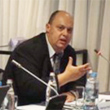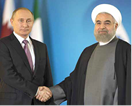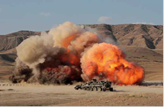
Russian-Turkish Relations and their Impact on NATO and the EU By Eugene Kogan, Tbilisi-based defence and security expert
The Black Sea region is one of the regions in which Turkey has lost its influence to Russia. NATO and the EU have no influence on relations between Russia and Turkey, as NATO has no mechanism for excluding Turkey as a member state, while the EU, although it has implicitly suspended negotiations on Turkey's possible membership, it is not prepared to make a clear statement that Turkey will not join the Union in the foreseeable future. READ MORE
Could the EU and Russia Restore the Dialogue on European Security?  By George Vlad Niculescu, Head of Research, the European Geopolitical Forum
By George Vlad Niculescu, Head of Research, the European Geopolitical Forum
Most international analysts agree that Western relations with Russia are at their worst in thirty years, and that they are unlikely to improve unless significant geopolitical changes are going to emerge. More recently, a new academic debate has started on whether, and how, to restore the EU-Russia dialogue to meet the interests of both parties, while trying to reconcile respect for international law with principled pragmatism into creating a new European security architecture. It might be therefore worth looking at the prospects of restoring EU-Russia dialogue through the lens of security scenario planning. READ MORE
- EGF Editor |
Published on EGF: 09.02.2018
| Security
-
Armenia, the Turkish Threat, and the Russian Antidote  By Benyamin Poghosyan, PhD, Executive Director, Political Science Association of Armenia
By Benyamin Poghosyan, PhD, Executive Director, Political Science Association of Armenia
The Afrin events are being used to assert the notion that without Russian military guarantees, and a Russian military base deployed in Armenia, Yerevan will be under a constant threat from a potential Turkish offensive.
Turkey's military operation in Afrin proved once more that in the current geopolitical situation in the Middle East nothing can be excluded. Obviously, Turkey had made its own calculations when it launched the offensive, and the muted reaction of the main players of the region can be perceived as a proof that some preliminary discussions had taken place before the start of the operation. The nonlinear relations between powers involved in the Middle East makes it really complicated to understand what lies beneath the surface in terms of motives and assessments. READ MORE
- EGF Editor |
Published on EGF: 02.02.2018
| Security
-
Russian-Iranian Relations: A Mixed Bag  By Eugene Kogan, Tbilisi-based defence and security expert
By Eugene Kogan, Tbilisi-based defence and security expert
The declaration that Russia and Iran are strategic partners lacks both solid foundation and strategic perspective.
Despite the sense of urgency generated by regional and global concerns, Russia and Iran have failed to establish broad-based economic, scientific, technical, educational and societal ties. In terms of arms exports, Russia still sees Iran as a customer, while Iran is doing its best to distance itself from Russia and to become self-reliant; Iran has recently turned to China in order to diversify its weapons imports away from Russia. Whether this divergence will continue remains to be seen. READ MORE
- EGF Editor |
Published on EGF: 09.01.2018
| Security
-
Georgian Military Modernisation: Two Steps Forward, One Step Back  By Eugene Kogan, Tbilisi-based defence and security expert
By Eugene Kogan, Tbilisi-based defence and security expert
At a press conference on 7 November 2016, Georgia’s minister of defence Levan Izoria announced plans to reform the country's armed forces, air force and air defence, but concluded that the construction of a new naval capacity was too costly. The Navy was disbanded in 2009 and merged with the Coast Guard, which is part of the Border Guard Division and reports to the Ministry of the Interior (MIA). It should also be emphasised that Izoria's reform plans were not the first and probably will not be the last ones. READ MORE
- EGF Editor |
Published on EGF: 18.12.2017
| Security
-
Kurdish region in turmoil
 By Benyamin Poghosyan, PhD, Executive Director, Political Science Association of Armenia
By Benyamin Poghosyan, PhD, Executive Director, Political Science Association of Armenia
There is uncertainty in Iraq's Kurdish Region after President Barzani's independence gamble misfires.
On September 25, 2017 Iraq's Kurdistan Regional Government (KRG) held an independence referendum with the overwhelming majority voting in favour of independence. The referendum was organized despite strong opposition from neighbouring Turkey and Iran, as well as Iraq's central Government, which called it illegal. Iraqi Kurdistan's decision to hold the referendum also in disputed territories, including the oil rich city of Kirkuk that have been under Kurdish control after the Iraqi army abandoned those territories as a result of ISIS advancements, caused further irritation in Baghdad. READ MORE
The New End Game (Part 2)  By Mehmood-Ul-Hassan Khan, EGF Affiliated Expert
By Mehmood-Ul-Hassan Khan, EGF Affiliated Expert
President Donald Trump has announced his most controversial “Afghan Policy” by blaming Pakistan for the strategic failure of his country in Afghanistan. He called Pakistan the only “destabilizing factor” for its “untamed militarization” of Afghanistan since 2001, by allegedly supporting, nurturing and financing terrorist groups. The new US Afghan Policy has also started a new end game in the region with prospective spill-over socio-economic, geopolitical and geo-strategic repercussions. READ MORE
- EGF Editor |
Published on EGF: 10.10.2017
| Security
-
The New End Game (Part 1)  By Mehmood-Ul-Hassan Khan, EGF Affiliated Expert
By Mehmood-Ul-Hassan Khan, EGF Affiliated Expert
The new “end game” has been started by the national, regional and international power brokers. Shahid Khaqan Abbasi, who has been sworn in as the new Prime Minister of Pakistan, has already announced his priorities. He said there would be no load-shedding after November this year, and he pointed out that ten thousands megawatts of additional electricity will be added to the national grid. The completion of the ongoing mega-projects of energy in different parts of Pakistan would also be one of his national priorities. READ MORE
- EGF Editor |
Published on EGF: 03.10.2017
| Security
-
As relations between Russia-Turkey get evermore friendly, should Armenia be concerned?  By Benyamin Poghosyan, PhD, Executive Director, Political Science Association of Armenia
By Benyamin Poghosyan, PhD, Executive Director, Political Science Association of Armenia
Turkey's decision to buy Russia's S-400 missile defence system opens a new stage in relations between the two countries.
Over the last two years Russia-Turkey relations have gone through tremendous transformations. Immediately after the November 2015 incident, when Turkish military jets shot down a Russian war plane, Russia imposed tough economic sanctions on Turkey and publicly accused President Erdogan of supporting terrorism, including "Islamic State". The situation dramatically changed in summer 2016 when Erdogan apologized for the November 2015 incident. READ MORE
- EGF Editor |
Published on EGF: 20.09.2017
| Security
-
Would have Russia found annoying the participation of Armenia in another NATO exercise?  By Benyamin Poghosyan, PhD, Executive Director, Political Science Association of Armenia
By Benyamin Poghosyan, PhD, Executive Director, Political Science Association of Armenia
Armenia did not turn up for a NATO military exercise in Georgia as was expected. The most probable reason may be the attempt of Yerevan to avoid jeopardizing its strategic alliance with Russia.
On September 3rd, NATO's Agile Spirit 2017 military drills were launched in Georgia with the participation of Georgian, US, Ukrainian, Romanian, Bulgarian, Latvian and Azerbaijani troops. Armenia was among the countries due to participate, but cancelled its involvement although the Armenian Ministry of Defence issued a statement on September 4th saying that Armenia had never decided to take part in that exercise. READ MORE
